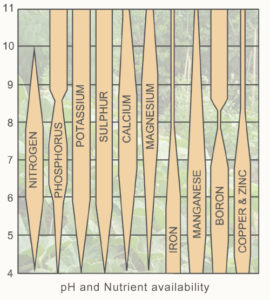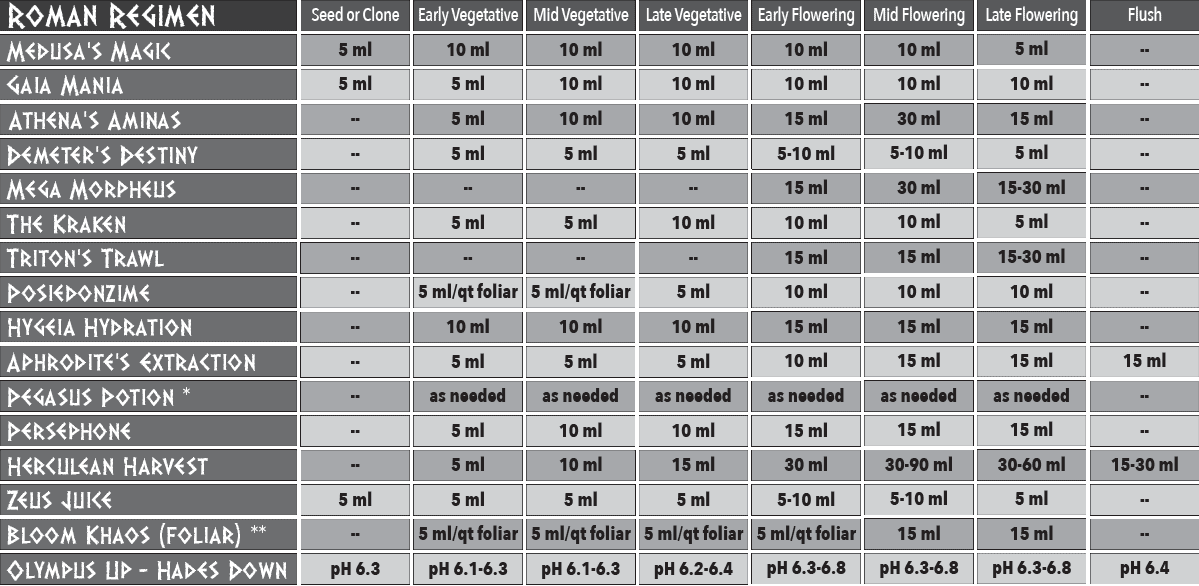How to use Nectar for the Gods
Nectar for the Gods takes a scientific approach to plant nourishment. It may seem unfamiliar at first but we believe that if you stick with it for a couple of weeks you and your plants will notice the difference.
Every gardener and every garden are different. As you become more familiar with these nutrients you can develop your own feeding regimen that works for you and your garden, but these feeding regimens are a good starting point.
Instructions:
By their nature these nutrients settle very quickly. It is crucial to shake the bottles thoroughly before pouring and to stir the feeding mixture throughout the mixing and feeding process.
1. Mix all four nutrients with water in the order they are listed on the chart from top to bottom.
2. When you have all the ingredients mixed with the water use a pH meter to measure the pH level. Continuously stir mixture as you’re taking your reading.
3. Once you have your pH reading, compare it to the range indicated on the bottom row of the feeding schedule and use Olympus Up or Hades Down to adjust the pH to within that range.
4. Slowly pour the mixture into the soil at the base of your plant.
Notes:
PH is critical. Nectar for the Gods is a calcium based line that is most available to the plant in a pH range of 6.2-6.8. Other nutrient lines rely on Nitrogen, phosphorous and potassium to deliver nutrition into the plant and when utilizing those elements they are most available in the range of 5.7-6.2. But since calcium is a reactive element, it will bind and carry other nutrients into the root system for your plants to utilize. It is critical with Nectar to check and adjust your feed nutrients before watering.
Start with good soil. The most important component in every garden (besides the nutritional program you choose) is the potting medium that you choose. Not all soils are created equally, so we encourage you all gardeners to test their soil’s pH and PPM (parts per million) values before planting in them.
We recommend doing a “slurry test”. This test will explain what is going on around root zone. To do this test take 2 ounces of medium as well as 2 ounces of pH neutral water and let them sit together in a container until the medium is fully saturated. Then insert your pH and PPM meters directly into the slurry and and document those numbers. Nectar for the Gods performs best when the medium is in the pH range of 6.3-6.8 and the PPMs are between 300-500. If you soil comes out with a lower pH and/or a higher PPM, a pre-planting flush with Herculean Harvest and/or Olympus Up will help correct these issues before planting.
When in doubt, flush it out. If you are noticing signs of deficiencies in calcium, potassium, magnesium or nitrogen, do not run out and buy a bottle of pretend cures! Nine out of ten times deficiencies will directly be related to your soil’s PPMs and pH numbers being out of whack. This would be a good time to do the “slurry test” and react accordingly. The calcium sources in Herculean Harvest and Olympus Up will help tie up excessive salts and neutralize the acids to bring your pH back into range.
The Spartan Regimen
The Greek Regimen
The Roman Regimen
If you have any questions or comments contact us. We can and will help.
FAQ
Why is Nectar For The Gods not in a 3 part series?
Why are microbes important and how do I feed them?
Why are there so many sources of calcium?
What is Chelation?
The other base nutrient is the organic fraction of soluble and suspendable proteins – humus that you will find in all soil, except possibly where no rain falls.
Do I need to use the entire line of Nectar For The Gods?
Why isn’t Nectar For The Gods OMRI listed?
Why is pH meter important with this nutrient line?
1). Having a low pH in the bottle helps preserve the product or put it to sleep without the use of salts or other cheating agents.

2). Starting with a low pH allows gardeners to use our Olympus Up product to raise their pH which also adds the benefits of another calcium source. When your pH is around 6.2 – 6.4, it allows most nutrients to be available to the plant and microbes. You can drop the pH to 6.0-6.2 in order to make phosphate more available. Or raise it up to the 6.4-6.8 to make calcium more available. Reference the pH scale chart to see what pH individual elements are most available.
Can I test ppm’s in organics?
Can I run Nectar in my hydroponic system?
Run to waste systems – works great!
Re-circulating systems – very important to have aeration and agitation to keep the nutrients from going anaerobic and from binding together and locking up. Please note however, we enhance the aromas of the nutrients with mint oils so they are more pleasant. When poured into and circulated in a reservoir, the mint will gass off and the natural aromas of the organic materials will present themselves. Do not panic when wretched smells come from your reservoir.
Aeroponics – Not recommended. This line is too thick for misters and emitters.



